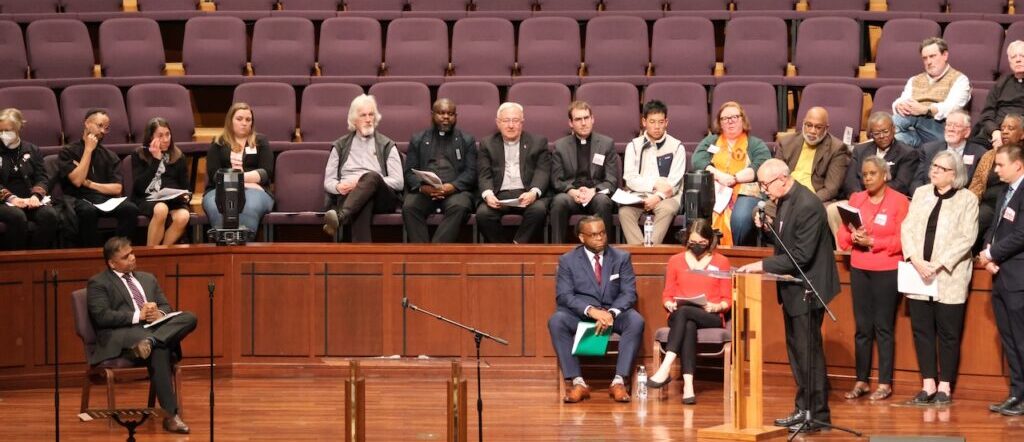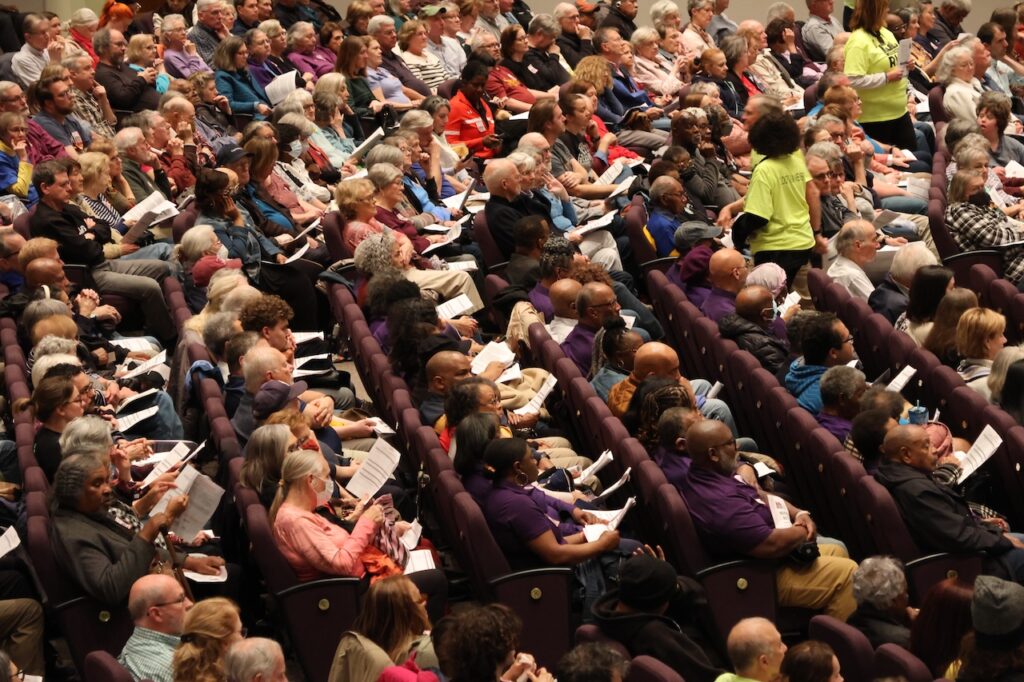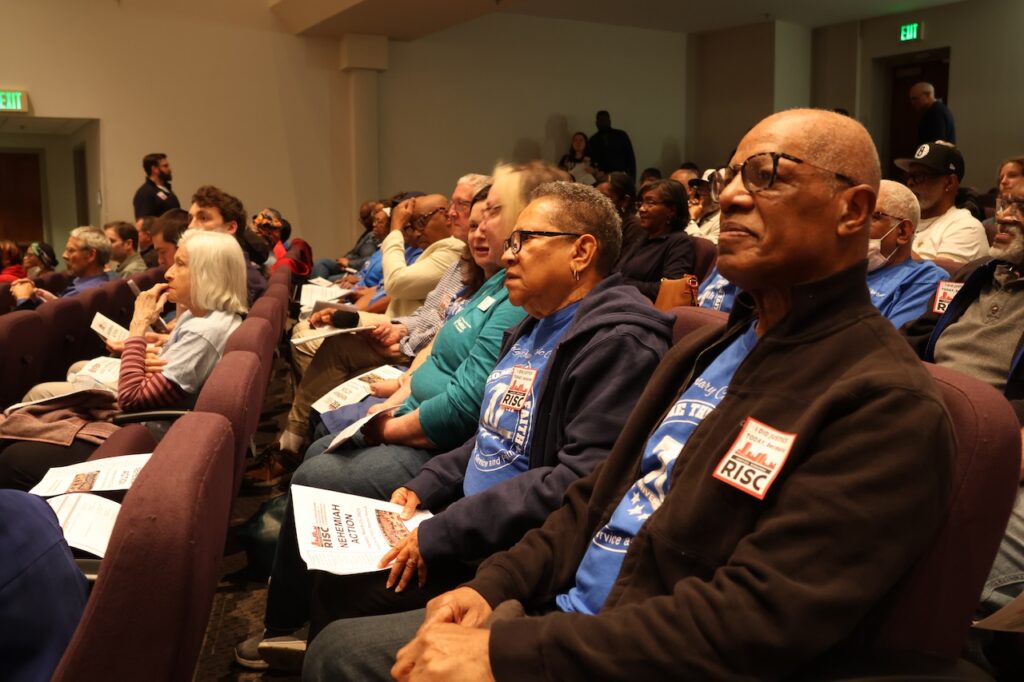At St. Paul’s Baptist Church on Creighton Road in Richmond the evening of March 25, more than 2,000 people – including over 600 Catholics – gathered for a public meeting with Richmond Mayor Danny Avula. Organized by Richmonders Involved to Strengthen our Communities (RISC), the annual Nehemiah Action meeting saw attendees seek real policy commitments from Avula, who was elected mayor last November.
RISC is an ecumenical Christian organization that advocates for legislative solutions to social justice issues in Richmond. On the agenda March 25 were actions to address gun violence, unsafe housing, and a lack of affordable housing.
Midway through the meeting, Jesuit Father Shay Auerbach, pastor of Sacred Heart, Richmond, addressed the mayor directly.
“Mayor Avula, earlier this month, you met with many local home residents who are here this evening. You saw sagging ceilings caused by leaking roofs and heard stories of mothers whose children suffer from asthma because of mold,” said Father Auerbach.
Father Auerbach then asked the mayor to make a pledge: to allocate $2 million per year of city money over the next three years to repair mobile homes, especially on Richmond’s South Side.
It was a commitment Avula declined to make. Previously, he had met on March 7 with families living in a mobile home park near Richmond Highway, and said he was concerned about the situation. However, he called the proposal for repairs “a Band-Aid on a gaping wound.” Instead, he promised to work to find city land to build new homes.
“By the time that that long term solution has been determined, approved, funded, and developed, the children you saw three weeks ago will be adults with chronic asthma and other serious health concerns,” Father Auerbach insisted.

Eventually, Avula agreed to allocate $800,000 for mobile home repair in the budget he would send to city council later that week, prompting huge cheers from the crowd.
But on March 27, when the budget was submitted to Richmond City Council, the allocation was not included.
“These homes are not healthy,” Father Auerbach later told The Catholic Virginian. “You walk in the homes and it can be difficult to breathe. In the winter, there are space heaters, and in the summer, window units … it’s a real drain on electricity.”
One Sacred Heart parishioner named Alba spoke about the problems in the trailer she shares with her son and husband, and noted that their electricity bill the previous month had been $568.
“The water that enters our house causes mold. It’s making people sick; we don’t have insulation, we don’t have heat, we don’t have air conditioning,” she said. “Imagine being a mother and knowing your own home is dangerous for your children, and you don’t have enough to make it safe.”
Affordable housing
Father Auerbach and Alba were not the only Catholics to address the mayor. Beverly Ross, parishioner at Sacred Heart and a retired nurse, joined Father Auerbach in expressing horror at what she called the “public health crisis” of unsafe housing.
Meanwhile, Nancy Kunkel, parishioner of St. Elizabeth, Richmond, was there to advocate for a slightly different issue: affordable housing.
In 2008, Richmond City Council created the Affordable Housing Trust Fund (AHTF), designed to be a source of gap funding for affordable housing developers. In 2021, City Council adopted an ordinance setting aside revenue for AHTF from tax abatements.
“Since then, none of those dollars have gone into the trust fund,” said Kunkel. “We have received various reasons why from the city, none of which make sense to us.”
Kunkel joined Sacred Heart parishioner Chava Soto and two Protestant ministers in urging Avula to put $10 million in tax abatements into the trust fund, starting in fiscal year 2026.
Instead, Avula said the city would add $10 million to AHTF by selling bonds. Last year, bonds totaling $7 million were sold to address affordable housing concerns, though not via AHTF. Meanwhile, the tax abatement originally allocated for AHTF has been re-allocated for debt service.
“I’m not sure if they’re planning to revise the ordinance or violate it,” said Kunkel. “It has been very frustrating.”

‘We can do better’
The mayor did agree with RISC on a plan to address gun violence in the city. He committed to contract with the National Institute for Criminal Justice Reform to implement the Group Violence Reduction Strategy (GVRS) within 90 days.
GVRS is a program that works with law enforcement to focus resources on individuals most at risk of suffering or perpetuating gun violence. In other cities, including Baltimore, implementation of GVRS has correlated with a reduction in homicides and shootings.
Avula also indicated that he is interested in funding AHTF in a “sustainable” way.
Father Auerbach said that Avula seems more willing to work with RISC than the previous mayor, Levar Stoney.
“There’s certainly real willingness to engage,” said Father Auerbach. “From what I understand, he’s a person of deep faith.”
The Catholic congregations who participated in the meeting included Cathedral of the Sacred Heart, Richmond; Holy Rosary, Richmond; Redeemer, Mechanicsville; Sacred Heart, Richmond; St. Edward the Confessor, Richmond; and St. Elizabeth, Richmond.
Besides Father Auerbach, there were many priests and deacons in attendance, including Father Jim Arsenault, pastor of St. Elizabeth; Father Tochi Iwuji, pastor of Holy Rosary; Deacon Chris Colville, who serves at Redeemer; and Deacon Chris Malone, who serves at the cathedral.
Mary Catherine Hargrove, who works with the Bon Secours volunteer ministry, was one of nearly 30 people who came from Holy Rosary.
“What makes me want to be here is seeing all the injustice in the world,” said Hargrove.
“My hope is that as a community in Richmond, we can work together to achieve God’s justice, with love for one another and human dignity for all,” she added.
Father Auerbach expressed his ongoing concern, particularly for 400 families in homes deemed critically unsafe, many of whom belong to his parish.
“My first funeral as a priest was for a little Afro-Mexican girl who died at three years old because she was asthmatic and her house got too hot,” said Father Auerbach. “That was totally an avoidable death. That was not here in Richmond, but it’s the same conditions. That was 25 years ago – we can certainly do better now.”

